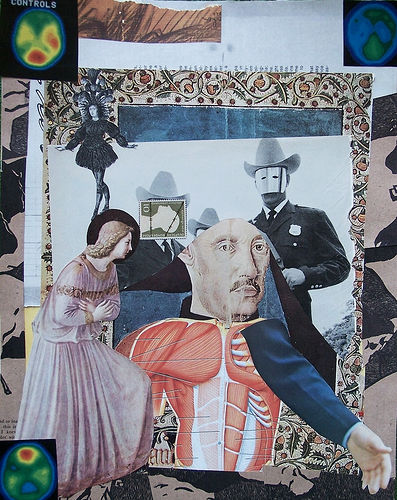You have no items in your cart. Want to get some nice things?
Go shopping
Anti-Oedipus is the 1972 first of a two part work by Gilles Deleuze and Félix Guattari, a philosopher and psychoanalyst respectively. Anti-Oedipus and its successor, A Thousand Plateaus, discuss the nature of capitalism and schizophrenia, attempting to rewrite and reinterpret Karl Marx’s socialism and Sigmund Freud’s psychoanalysis, to develop a new variant of psychiatric practice. The book is divided into four segments to produce a narrative with the aim of a producing a conclusion supporting this ‘schizoanalysis’. Through the course of the book, Deleuze and Guattari draw on a number of subject areas such as history, literature, economics and medicine to establish and define a sprawling theory on human psychology and sociology. This essay aims to vivisect these ideas and re-examine them through the filter of 21st century psychiatric thought.
Though they consult many cultural giants, Burroughs, Ginsberg, Kafka, Beckett, Miller, Marx for their perspective on madness (even a syphilitic Nietzsche), there is little mention of those who actually managed and treated psychotic illness, Lacan and Freud having such a narrow range in the patients which they sought to cure. This discrepancy and lack of an organic perspective is an overlooked missing piece to the puzzle, especially given the rising body of evidence establishing organic causes of schizophrenia and mental illness. Citing these works is a futile activity merely serving to establish philosophical ‘cred’ and impress liberal arts students. It is egoistic and Onanistic; troubling in a book given to deconstructing the Ego of Society.
Much of the work is a clear succession from Nietzsche’s Anti-Christ; a lot of the discussion can be seen as an update to the ‘Will to Power’ sublimated with a will to arousal (as such the judge dispensing justice is aroused by his carrying out his action within a societal niche). Thus there is the subversion of the concept of the Will to Power via the Will to Desire, in effect. This encompasses the freedom of desire, a freedom not to have society imposed on an individual’s desire; an idea key in the development of later sexual and identity politics.
Also interesting is the further interpretation of Marx’s ideals of the struggle throughout history of the working classes. This is explained within the work as the desire to be led, this is why fascism/oligarchy prevails, people desire comfort and want to shirk responsibility. Readers of Alan Moore’s V for Vendetta shall find this familiar. The anarchist opinions of the authors are thinly veiled as they define Anti-Oedipus as anti-labels, anti-Nation, anti-School, anti-isms and advocate for the complete destruction of ego prejudice. The Madness and Civilisation concepts of Priests oppressing Lepers here rear their heads as psychoanalysis is conceptualised as a power structure, an institution such as the church with Freud as a paternalistic priest.
In this we see the origin of the title of the work: Anti-Oedipus is the death blow to the Oedipal ideas of Freud and Lacan. In its critique of psycho-analysis, there is admission of the psychoanalysts’ overlooking of psychotic illness, due to lack of engagement and inability to transfer. However, the failure is ascribed more to the failure of the schizophrenic rather than that of psychoanalysis. Here is the problem of the whole work; it is too keen to dictate to nature and establish high-minded theories rather than observe what is present and draw conclusions based off of these types of observations.
A key lesson for medical and clinical practitioners to take away is on the dangers of pathologising everything lying outside of the spectrum of the norm. Indeed, the move away from authoritarianism in medicine and medical diagnosis is currently in vogue such that in my earlier years of medical school paternalism was a dirty word for the faculty. This is not something I entirely agree with, though it is important for good concordance that a patient is able to state their opinion and the clinician should compromise if necessary to ensure a productive therapeutic relationship.
However, the authors’ interpretation of schizophrenia must be partially discarded or else the attribution shifted in light of modern neuroimaging evidence. And this is where I am largely dissatisfied with the work: there is little discussion involving the actual experience and livelihood of those with schizophrenia, instead there is abstract philosophising which holds them up as some sort of Foucault ideal of counter-culture. This is not a trend unique to Anti-Oedipus and is concerningly prevalent in much of the humanities, which can be attributed to the wide influence of the previously mentioned French thinker. This pedestal placing of individuals suffering from ‘madness’ does little to aid or empower them and is a harmful concept.
My primary concern with Anti-Oedipus is its lack of academic and scientific rigour, often trading these for witty references to literature and arguments from epistemology. Though it is keen to draw on embryology, calculus and biology, there is much misunderstood science (using humanity’s supposed relation to grass and the needless inclusion of calculus to explain the relationship of labour power to variable capital in a capitalist society as examples). The authors often opt to use fictional examples of patients over real ones. This is circular judgement as most of the fictionalised patient narratives are constructed using the sample theories of psychoanalysis which the work attempts to prove or disprove. The repeated mentions of the case of Judge Schreber, mirror Freud’s narrow patient populations and sample sizes in establishing a theory (less than 100 upper middle class Austrians, many of whom were known to him). As such, the concepts delivered such as The Body Without Organs at times borders on the esoteric and leans dangerously close to vitalism.
Even with modern thought on neuroplasticity, paranoia and revolution are not comparable. To an extent schizophrenia is a product of the environment, but much of these anti-authoritarian ideas stating that fascist governments produce schizophrenia are untenable and not borne out by the evidence. Still, the idea of liberating individuals from labels is promising if it provides a scope to tailor a treatment to a patient, to deal with a disease on a patient by patient basis as a practitioner.
The use of philosophy to treat a patient is equally negligent. The patients’ condition is conducive of poor judgement. Most would not appreciate self-actualisation in a crisis due to lack of safety, thus any philosophising is pointless. Still, psychoanalysis is not a tool for interpreting psychosis, the psychotic patient cannot engage with the therapist. In this we see the frequent confusion of psychiatry and psycho-analysis, which may be that psychiatry has moved beyond psycho-analysis in Europe since Anti-Oedipus was published. The contrast of 21st century versus 1960’s theories on the development of mental health serve to show how far modern psychiatry has come.
So in conclusion, Anti-Oedipus is a good review and evisceration of Freud, Lacan and Klein’s psychoanalysis. However, the substitute is not satisfactory and subject to the same failings as the system it replaces; it is not grounded in reality, it does not cure or manage difficulties of patients and it has no bearing or interaction with the organic roots of these diseases. The further you move as in Felix and Guittari towards rationalized epistemology of symptoms, the further you move away from any clinical benefit towards the patient and concrete answers. Anti-Oedipus talks loud without saying much; fans of anti-psychiatry, semiotics and hermeneutics read away.

About George Aitch
George is writer from Blackheath. He has written for The Guardian, Litro and The British Journal of Psychiatry. You may find his work in print and online in places such as Storgy, Bunbury Magazine and The Crazy Oik among others. His essay ‘What Do You Do When It All Goes Wrong’ was recently shortlisted by Ascona.




